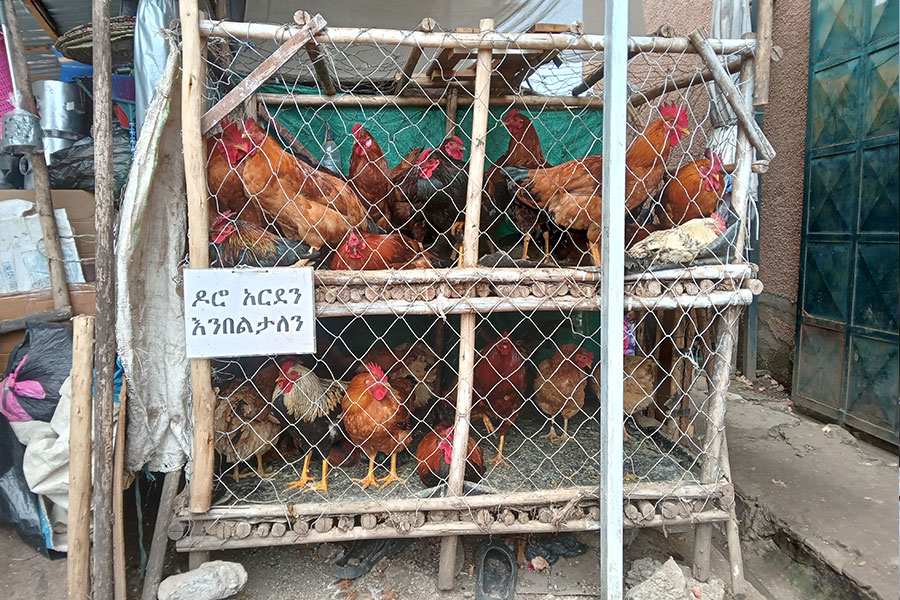
Commentaries | Jul 09,2022
An industrial paradox unfolds as a considerable salt shortage grips the manufacturing sector, despite the country sitting atop a vast reserve of this crucial industrial commodity.
The situation, as described by the Minister of Industry, Melaku Alebel, appearing last week before parliament's standing committee for Industry & Mining, chaired by Amarech Bekalo (PhD), brings to the fore the inefficiencies within the supply chain that are starving the manufacturing sector of an essential resource. He warned about the severe implications of salt scarcity on manufacturing outputs.
Despite an ample deposit in Afar Regional State, capable of yielding 36 million quintals of salt, manufacturers are forced into a corner, due to the lack of supply. Melaku described the situation as a "paradox of sorts," with vast salt reserves lying unused due to market access constraints and factories facing acute shortages.
"It's rather shameful to admit that there is a salt shortage," Melaku said.
The Ministry's half-year report to Parliament disclosed that manufacturing industries received only 63pc of their salt demand to the tune of 157,000Qtls.
The crux of the issue lies in the newly implemented regulations that mandate the infusion of "Naphthalene" in industrial salt, a requirement that has sidelined the traditional supply chain agents and led to the shutdown of processing plants. The regulatory curveball has not only caught miners and processors off guard but also compounded the operational despairs of sectors heavily reliant on salt, such as leather tanning.
Batu Tannery Plc, a leather tanning company incorporated 24 years ago, now operates at a mere third of its daily 3,000 square feet capacity, its General Manager, Tatek Yirga, disclosed. It is struggling to source the salt, which used to be primarily supplied by the Ethiopian Industrial Inputs Development Enterprise (EIIDE). The shortage has forced Tatek to search for the premium-priced markets of the Mercato area for the 2,000Qtls of salt his company requires monthly, a move that eats into the company's margins and operational efficiency.
"Our problems have piled on top of one another," he told Fortune.
A history of logistical and political upheaval mars the salt market. Following the war with Eritrea, Ethiopia's salt supply chain underwent a significant transformation, shifting from Eritrean processing plants to Djibouti and recently established plats in the Afar Regional State. The changes, while geographically logical given Afar's proximity to the salt-rich Dinkali Depression, introduced new problems in transporting the mineral over 1,000Km to the capital and other industrial hubs.
The logistical puzzle is further complicated by the plight of salt miners like Anwar Ahmed in Afdera Woreda. Despite the hard labour, he has found himself unable to sell a kilo of salt over the past five months due to regulatory and technical barriers. The story of Anwar, struggling to provide for his family amid these market failures, paints a contrasting picture of the human cost underlying the industrial salt crisis.
The shutdown of SVS Salt Production PLC, a reliable market for miners with an annual capacity of nearly 540,000tns, and new legislation requiring the infusion of Naphatlene for industrial salt in Afar have eliminated available buyers.
"I don't even know what Naphatlene is," said Anwar, who is among the 2,500 miners in Afdera who have a monthly quota to produce 675,000Qtls, of which half is supplied to the four processing plants in the region, with the rest supplied to enterprises owned by the regional state.
"Someone should bring these chemicals," he said. "So that we can get on with our lives."
A directive for Naphthalene infusion and the prohibition of raw salt export from mining regions, issued by officials of the Ministry of Trade & Regional Integration (MoTRI), has not only disrupted the supply chain but also raised the salt prices significantly. Alemu Assefa, from EIIDE, recounts the immediate price surge by 500 Br to 1,200 Br following the directive's enforcement and the seizure of salt shipments for lacking Naphthalene, a compound many, including those in the industry, are unfamiliar with.
Naphthalene is an organic compound with a wide range of industrial applications, from the manufacture of mothballs to the synthesis of complex chemicals used in various sectors. Despite its utility, the handling of naphthalene requires careful consideration of its health and environmental impacts.
The directive also restricted the exit of raw salt from mining regions, risked the removal of the mandate of EEIDE in distributing raw salt across the country and required the establishment of processing plants within mining regions.
Alemu recalled an incident two months ago in which nine trucks hauling salt from Afdera to the Enterprise were seized by officals from the Ethiopian Food & Drug Authority for lacking Naphatelene.
"That is how we found out about the changes," Alemu told Fortune.
The Enterprise has been distributing 30,000Qtls of salt seized from contraband traders until it figures out what Naphthalene is and how to infuse to supplies from Afar.
The regulatory maze has sparked criticism from various quarters, including Tarekegn Bululta, the State Minister for Industry, who argued that the directive complicates an already demanding situation.
"The Prime Minister has given directions," Tarekegn told Fortune. "It's the Trade Ministry dragging along."
Several senior officials of the Ministry of Trade & Regional Integration were not immediately available to comment on the development of this story.
Critics argue that the policy fails to consider the operational realities of the salt industry, from mining to processing and distribution, thereby undermining the sector's potential to meet household and industrial needs. However, the shift in policy has ignited concerns over the marginalization of non-salt mining regions and the disregard for existing supply chains, which some argue contravenes laws.
"It defies the investment law," said Dugaassa Dunfa, a senior advisor to the Industry Minister.
The sentiment is echoed by two publicly owned enterprises in Afar, who find the Naphthalene requirement perplexing and out of touch with the industry's technical capabilities.
A letter penned by Girma Alamar, of the Minister of Industry, had cautioned against the implementation of the Trade Ministry's directive, foreshadowing serious disruption to the supply chain.
Manufacturing consultant and chemist Seleshi Ayalew argued that naphthalene only helps to prevent the deterioration of hides during the leather tanning process and not much more.
"There are several other chemicals that can do that," he told Fortune. "It isn't surprising that salt processors would be confused."
Amid these regulatory and logistical disputes, experts like Seleshi urge a reevaluation of priorities. He predicted serious challenges finding foreign currency for Naphtalin imports.
PUBLISHED ON
Feb 07,2024 [ VOL
24 , NO
1241]

Commentaries | Jul 09,2022

My Opinion | Apr 03,2021

Featured | Sep 27,2025

View From Arada | Aug 21,2021

Fortune News | Jul 29,2023

View From Arada | Dec 26,2020

Fortune News | Jan 19,2024

Radar | May 15,2021

Radar | Nov 30,2019

Fortune News | May 11,2019

Dec 22 , 2024 . By TIZITA SHEWAFERAW
Charged with transforming colossal state-owned enterprises into modern and competitiv...

Aug 18 , 2024 . By AKSAH ITALO
Although predictable Yonas Zerihun's job in the ride-hailing service is not immune to...

Jul 28 , 2024 . By TIZITA SHEWAFERAW
Unhabitual, perhaps too many, Samuel Gebreyohannes, 38, used to occasionally enjoy a couple of beers at breakfast. However, he recently swit...

Jul 13 , 2024 . By AKSAH ITALO
Investors who rely on tractors, trucks, and field vehicles for commuting, transporting commodities, and f...

Oct 25 , 2025
The regulatory machinery is on overdrive. In only two years, no fewer than 35 new pro...

Oct 18 , 2025
The political establishment, notably the ruling party and its top brass, has become p...

Oct 11 , 2025
Ladislas Farago, a roving Associated Press (AP) correspondent, arrived in Ethiopia in...

Oct 4 , 2025
Eyob Tekalegn (PhD) had been in the Governor's chair for only weeks when, on Septembe...